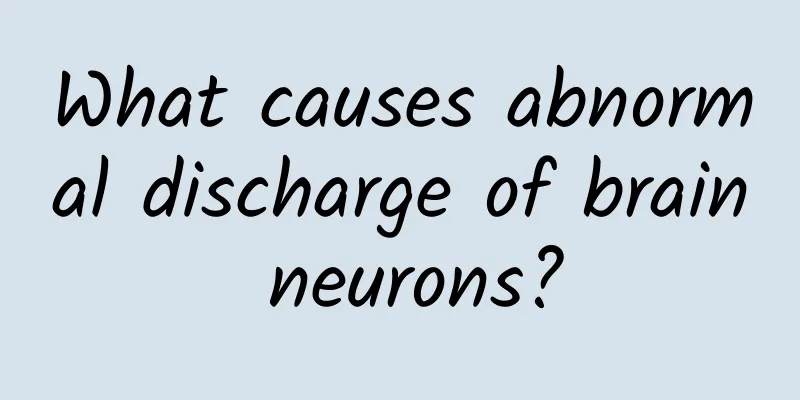Symptoms of Neurasthenia

|
People's spiritual life and many white-collar working-class people come from work pressure and family pressure. Due to the increase in life pressure, many patients suffer from insomnia, depression, and poor rest. In fact, neurasthenia is not only caused by insomnia. Many emotional symptoms and other conditions can cause insomnia. Many friends don’t know much about neurasthenia. They just feel very tired and often suffer from insomnia. They don’t know much about the symptoms of neurasthenia. Neurasthenia is a common neurological disease. The symptoms of neurasthenia include not only insufficient energy, inability to use the brain, and sleepiness, but also excitement and emotional symptoms. For example, in daily life, many friends are easily emotionally excited or have large mood swings, which may cause neurasthenia. 1. Asthenia symptoms These are the common basic symptoms of this disease. Patients often feel lack of energy, listlessness, inability to use their brains, or slow mental ability, limb weakness, drowsiness and sleepiness; especially after working for a long time, they feel unable to concentrate, have difficulty thinking, and their work efficiency is significantly reduced. Even adequate rest is not enough to recover from their fatigue. Many patients complain that they are forgetful, often make mistakes when speaking, and cannot remember what they have just experienced. 2. Excitement symptoms: Patients are easily excited when reading books or watching TV, and they can't help but have more memories and associations. Patients find it difficult to think in a directed way, but their undirected thinking is very active and uncontrollable. This phenomenon is particularly obvious before falling asleep, which makes patients feel deeply distressed. Some patients are also sensitive to sound and light. 3. Emotional symptoms mainly manifest as being easily annoyed and irritable. The content of worries often involves various contradictions in real life, which feel difficult and unsolvable. On the other hand, self-control is weakened, and one becomes easily agitated when encountering things; or one becomes irritable and angry, loses temper with family members, and then feels regretful afterwards; or one becomes easily sad and cries. About 1/4 of patients experience anxiety and have doubts, worries, and nervousness about their illnesses. For example, patients may suspect they have heart disease due to palpitations and rapid pulse; or worry they have stomach cancer due to abdominal distension and anorexia; or believe they have an incurable disease due to poor treatment results. This kind of hypochondriacal mentality can increase the patient's anxiety and tension, forming a vicious circle. About 40% of patients experience brief, mild depression during the course of the disease, with scores on the Hamilton Depression Rating Scale often below 10. There may be self-blame, but there is generally no suicidal ideation or attempt. Some patients feel resentful and blame others for the cause of their illness. 4. Tension pain is often caused by tension, with tension headache being the most common. Patients feel a heaviness, swelling, tightness or stiffness in the head; some complain of back pain or muscle pain in the limbs. 5. The most common sleep disorders are difficulty falling asleep and tossing and turning, which lead to irritability and make it even more difficult to fall asleep. The second is to complain of having many dreams, waking up easily, or feeling that the sleep is very shallow, as if there was no sleep all night. Some patients feel tired but still sleepy after waking up; or they feel sleepy during the day, but when they go to bed, their brains are excited and they have difficulty falling asleep, which manifests as a disorder of sleep rhythm. Some patients, although they have fallen into a sound sleep and snore loudly, will firmly deny that they have slept after waking up and lack a real sense of sleep. The worry and distress caused by insomnia in this type of patients often exceeds the pain caused by the sleep disorder itself, reflecting the patient's anxious mood about sleep. 6. Other common psychological and physiological disorders include: dizziness, blurred vision, tinnitus, palpitations, heart palpitations, shortness of breath, chest tightness, abdominal distension, indigestion, frequent urination, sweating, impotence, premature ejaculation or menstrual disorders. Although these symptoms lack specificity and are also common in anxiety disorders, depression, or somatization disorders, they can become the main complaint of patients seeking treatment for this disease, thus masking the basic symptoms of neurasthenia. The symptoms of neurasthenia are not just a neurological disease caused by poor sleep quality. There are many other reasons that affect neurasthenia. Sleep disorders are only one of the causes of neurasthenia. Psychological and mental disorders can also cause neurasthenia. Many friends do not understand the symptoms of neurasthenia, but I believe they have some knowledge through our introduction. If you find this disease, you should go to the hospital for diagnosis and treatment in time, and do not delay the disease. |
>>: Xiaoman Health Preservation Chinese Medicine teaches you how to prevent diseases
Recommend
Can kidney deficiency cause insomnia? What to eat for insomnia caused by kidney deficiency
In daily life, insomnia is a common symptom for m...
How to treat severe insomnia
Our lives are now fast-paced, and a moment of neg...
How to use safflower oil? Correct use will have good effects
As a medicinal oil that can treat a variety of sy...
Why do I wake up with swollen eyes every day?
Sleep is the happiest thing for human beings, esp...
Will chest nodules disappear on their own?
Everyone may only know that nodules are around th...
Diet therapy for chronic eczema
Eczema is a disease that many people are familiar...
Why do at least nine out of ten women have gynecological diseases?
Many gynecological diseases often trouble women&#...
Achilles tendinitis rehabilitation training
Rehabilitation training for Achilles tendonitis i...
Something is rolling in the ears
Occasionally, you may feel something shaking in y...
Why does bleeding occur during pregnancy?
A small number of pregnant women will experience ...
Male nipple itching
In life, most women pay more attention to the hea...
The role of Pudilan
Pueraria lobata is a type of anti-inflammatory dr...
The fastest way to remove heat toxins
Heat toxins occur on the surface of the skin. It ...
Symptoms of pituitary tumors
The pituitary gland is the organ that secretes th...
What is the reason for children's teeth grinding? Nighttime teeth grinding is related to three factors
Among infants and young children, nocturnal teeth...









